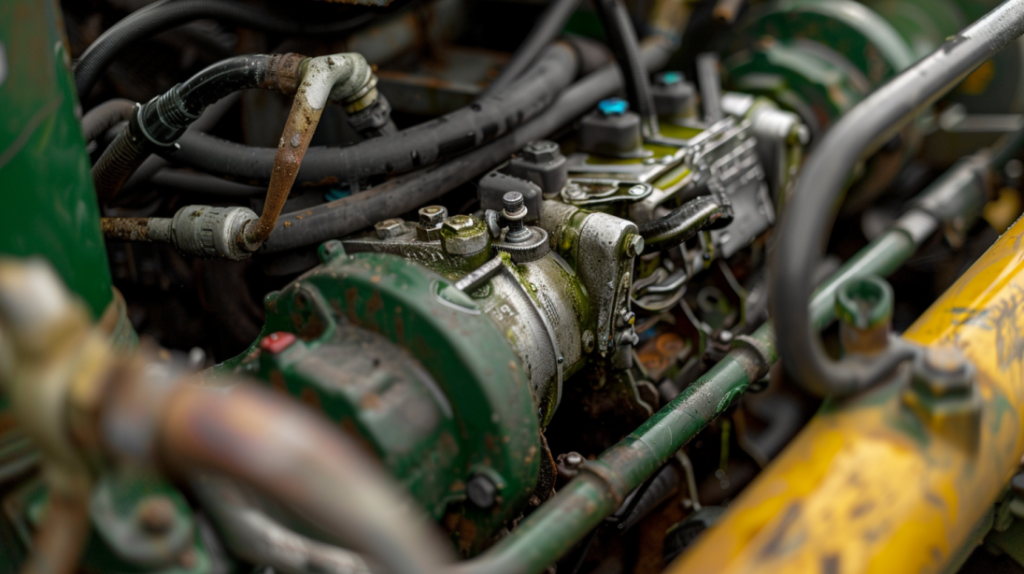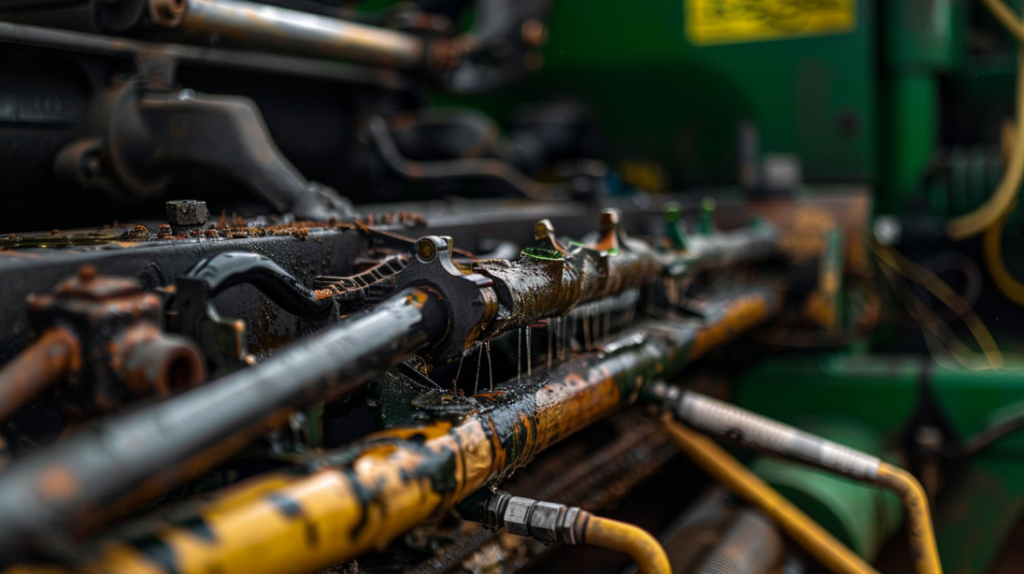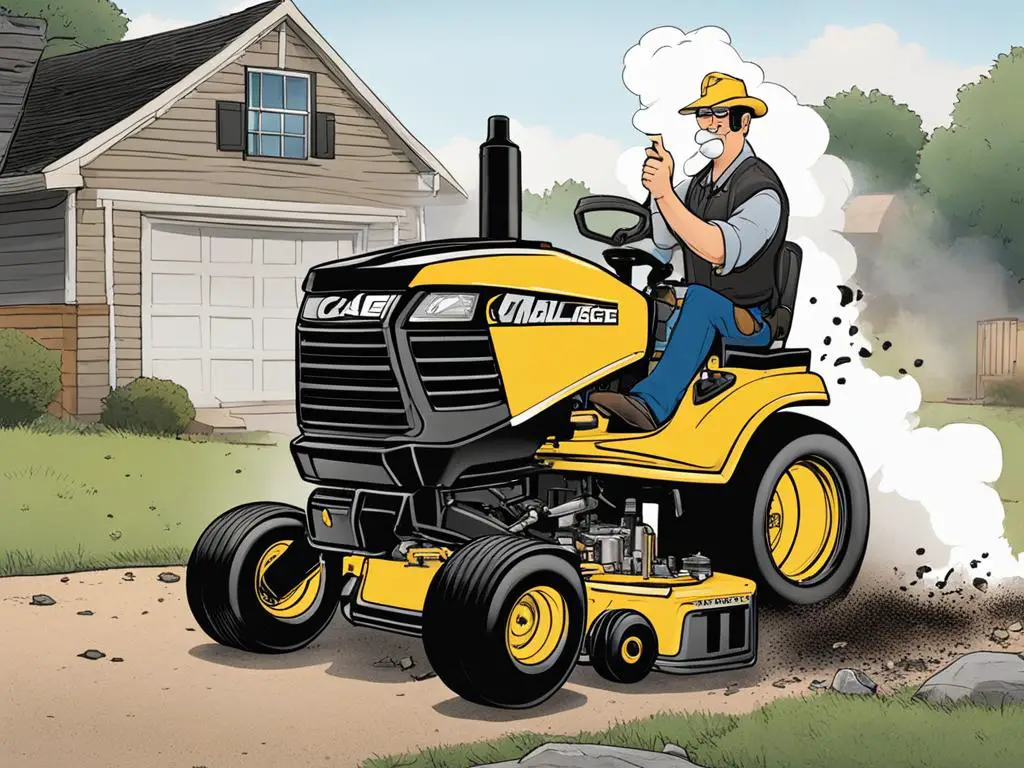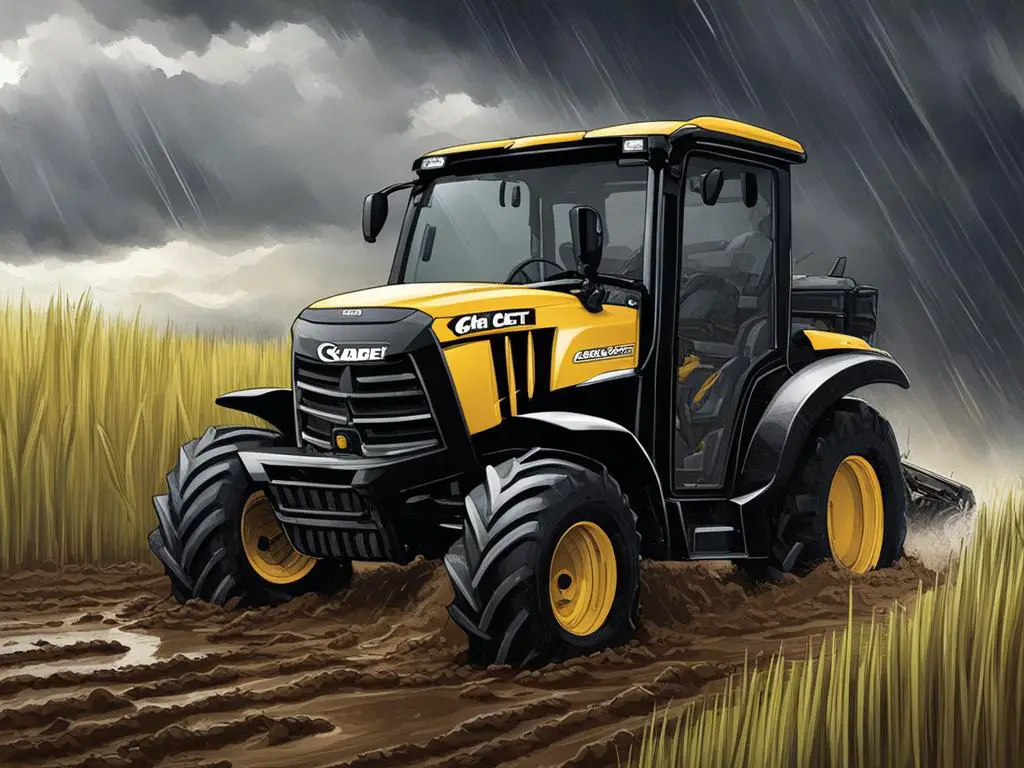Address clogged fuel filters, spark plug wear, and low oil levels for efficient engine performance on your John Deere Z445 mower. Resolve deck issues like uneven mowing heights, slipping belts, and blades not engaging promptly. Keep an eye out for hydraulic leaks from hoses, fittings, and seals, tackling them systematically. Regular maintenance, such as checking blades for dullness and adjusting cutting heights, guarantees peak mower operation. Explore further for detailed troubleshooting tips and repair suggestions to keep your John Deere Z445 in top shape.
Key Takeaways
- Check for hydraulic leaks, focusing on hoses, fittings, and seals.
- Maintain proper oil levels and change regularly for engine health.
- Inspect deck for cracks, dents, and rust; repair as needed.
- Adjust cutting height for even mowing and prevent strain.
- Bleed the hydraulic system to address any performance issues.
Engine Issues

If your John Deere Z445 is experiencing engine issues, the most common problems may stem from fuel system components or engine maintenance neglect.
One of the primary culprits could be a clogged fuel filter, restricting the flow of gasoline to the engine. Check the fuel filter for debris and replace it if necessary to ensure proper fuel delivery.
Another issue could be related to the spark plug. Over time, spark plugs can wear out or become fouled, leading to poor engine performance. Inspect the spark plug for signs of wear or deposits, and replace it if needed to restore peak engine function.
Additionally, inadequate oil levels or dirty oil can cause engine problems. Make sure that the oil levels are adequate and the oil is clean and in good condition. Regularly changing the oil according to the manufacturer’s recommendations is essential for engine health.
Deck Problems
If you’ve noticed uneven mowing heights with your John Deere Z445, it could be due to deck problems.
The belt slipping off during operation is a common issue that can disrupt the cutting process.
Additionally, blades not engaging properly can lead to an inconsistent mowing experience.
Uneven Mowing Heights
To address the issue of uneven mowing heights on your John Deere Z445, it’s important to inspect the deck for potential problems that may be causing this issue. Here’s a guide to help you troubleshoot and rectify this problem:
- Check Deck Leveling: Confirm the deck is level from side to side and front to back. Use a leveling tool to make adjustments accordingly.
- Inspect Blades: Examine the condition of your mower blades. Dull or damaged blades can lead to uneven cutting. Sharpen or replace them as needed.
- Clean Under the Deck: Remove any debris or grass buildup under the deck. A clean deck allows for a more even cut.
- Tire Pressure: Uneven tire pressure can also cause mowing height discrepancies. Check and adjust the tire pressure as per manufacturer recommendations.
Belt Slipping off
Inspect the belt tension and pulley alignment to troubleshoot and resolve the issue of the belt slipping off on your John Deere Z445 mower deck. Begin by confirming that the belt is correctly tensioned. A loose belt can easily slip off during operation. Adjust the tension according to the manufacturer’s guidelines to prevent slippage.
Additionally, check the pulley alignment. Misaligned pulleys can cause the belt to veer off its track. Align the pulleys properly to maintain the belt’s position and reduce the risk of slipping.
Examine the condition of the belt for any signs of wear or damage. A worn-out belt is more prone to slipping and should be replaced promptly. Confirm that the belt is the correct size for your mower deck to prevent fitting issues that could lead to slippage.
Regularly inspecting and replacing worn belts is essential for top performance and to avoid belt-related problems such as slipping off. By following these steps, you can effectively address and prevent belt slippage on your John Deere Z445 mower deck, ensuring smooth and efficient operation.
Blades Not Engaging
Check the engagement cable for proper connection and functionality to address issues with blades not engaging on your John Deere Z445 mower deck. When your blades refuse to engage, it can disrupt your mowing routine. Here are some steps to troubleshoot and resolve this problem:
- Inspect the Engagement Cable: Verify the engagement cable is connected securely at both ends and free of any damage or wear that could impede its function.
- Check the PTO Switch: Confirm that the Power Take-Off (PTO) switch is in the ‘ON’ position. If the switch is faulty, consider replacing it to restore blade engagement.
- Examine the PTO Clutch: The PTO clutch may be worn out or malfunctioning, preventing the blades from engaging. Inspect the clutch for any signs of damage and replace if necessary.
- Assess the Deck Belt: A loose or damaged deck belt can also hinder blade engagement. Tighten or replace the belt to ensure proper functioning of the blades.
Hydraulic System Faults

If you notice hydraulic leaks on your John Deere Z445, it’s important to address them promptly to prevent further damage.
Common areas for leaks include hoses, fittings, and seals, which can often be resolved by tightening connections or replacing damaged components.
Troubleshooting the hydraulic system systematically by checking fluid levels, inspecting for visible leaks, and ensuring proper pressure can help diagnose and fix issues efficiently.
Common Hydraulic Leaks
When encountering common hydraulic leaks in your John Deere Z445, the first step is to identify the source of the leak to effectively address the hydraulic system faults. Hydraulic leaks can lead to decreased performance and potential damage to the system if left unattended.
Here are some common hydraulic leak issues and solutions:
- Worn Seals: Inspect the seals in the hydraulic system for wear and tear. Replace any damaged seals to prevent leaks.
- Secure Connections: Check all connections in the hydraulic system for tightness. Secure any loose fittings to stop leaks.
- Damaged Hoses: Examine the hydraulic hoses for cracks or punctures. Replace any damaged hoses to eliminate leaks.
- Prevent Overheating: Hydraulic fluid that’s too hot can cause leaks. Ensure proper cooling of the system and monitor fluid temperature to prevent overheating issues.
Troubleshooting Hydraulic System
Inspecting the hydraulic system of your John Deere Z445 for faults requires a systematic approach to identify and resolve potential issues effectively. If you notice erratic operation, slow response, or unusual noises, there may be a fault in the hydraulic system. Start by checking the hydraulic fluid level and quality. Low fluid levels or dirty fluid can lead to system malfunctions. Make sure there are no visible leaks in the hoses, fittings, or cylinders. Leaks can cause a drop in system pressure, affecting performance.
Next, examine the hydraulic filters for clogs or damage. Restricted filters can impede the flow of fluid, leading to issues in the system.
If everything looks intact externally, the issue may lie internally. Internal faults like a failing pump, worn-out seals, or a malfunctioning control valve could be the culprits. In such cases, it’s advisable to seek professional assistance to diagnose and repair the problem accurately.
Regular maintenance, including fluid checks and filter replacements, can prevent many hydraulic system faults, ensuring excellent performance of your John Deere Z445.
Troubleshooting Tips for Engines
Regularly check the spark plugs and air filter for any signs of wear or clogging to maintain peak engine performance on your John Deere Z445 mower. Ensuring these components are in best condition will help prevent potential engine issues. Here are some troubleshooting tips to keep your engine running smoothly:
- Inspect Spark Plugs: Check for signs of fouling, such as blackened or oily deposits. Replace spark plugs if necessary to maintain proper ignition.
- Clean or Replace Air Filter: A dirty air filter can restrict airflow, leading to poor engine performance. Clean or replace the air filter regularly to prevent this issue.
- Check Fuel Quality: Stale or contaminated fuel can cause engine problems. Make sure you’re using fresh, clean fuel to avoid fuel-related issues.
- Monitor Oil Levels: Low oil levels or dirty oil can damage the engine. Check oil levels regularly and change the oil as recommended by the manufacturer to keep your engine well-lubricated and running efficiently.
Repair Suggestions for Decks
To maintain the peak performance of your John Deere Z445 mower’s deck, promptly address any signs of damage or wear with the following repair suggestions.
First, inspect the deck for any cracks, dents, or rust spots. If you notice any of these issues, consider patching small cracks with a suitable metal epoxy or welding for more severe damage.
Next, check the blades for dullness or bending. Sharpen or replace the blades as needed to guarantee a clean and precise cut.
Additionally, lubricate the deck spindles and pulleys regularly to prevent friction and wear. Clean out any debris or grass clippings that may have accumulated underneath the deck to maintain proper airflow.
Finally, adjust the deck’s cutting height according to the grass length to prevent strain on the mower and ensure an even cut.
Hydraulic System Troubleshooting and Fixes

Check the hydraulic system of your John Deere Z445 mower for any signs of leakage or reduced performance to troubleshoot and apply the necessary fixes promptly.
Here’s how you can address common hydraulic system issues:
- Verify for Leaks: Inspect the hydraulic lines, fittings, and connections for any signs of oil leaks. Tighten loose connections and replace damaged components to prevent further leakage.
- Fluid Level Inspection: Confirm the hydraulic fluid is at the correct level. Low fluid levels can cause the system to operate inefficiently or lead to damage. Top up the fluid if needed with the manufacturer-recommended type.
- Filter Replacement: A clogged or dirty hydraulic filter can impede the system’s performance. Regularly check and replace the filter as per the maintenance schedule.
- Bleed the System: If you notice air in the hydraulic system, bleeding it can help restore proper functionality. Follow the manufacturer’s guidelines to bleed the system effectively.
Frequently Asked Questions
Can I Use Regular Gasoline in My John Deere Z445?
Regular gasoline meets this requirement and is commonly used in small engines like those found in lawnmowers. Just make sure the gasoline is fresh and free from contaminants to prevent issues with fuel system components.
Regular maintenance will help keep your Z445 running smoothly.
Are There Any Recalls or Warranty Extensions for Z445 Models?
However, it’s crucial to stay updated by regularly checking John Deere’s official website or contacting a certified dealer for any future announcements or changes.
Regular maintenance and proper care can help prevent potential issues and guarantee peak performance of your Z445 mower.
Remember to follow the manufacturer’s guidelines to keep your equipment running smoothly
How Often Should I Replace the Air Filter in My Z445?
Neglecting to change the air filter can lead to decreased power output, increased fuel consumption, and potential engine damage. By following this schedule, you’ll keep your Z445 running smoothly and efficient
What Is the Recommended Maintenance Schedule for Z445 Models?
Imagine your mower as a finely tuned instrument that requires regular tuning to perform at its best. Following these maintenance guidelines will guarantee top performance and extend the lifespan of your Z445.
Are There Any Common Electrical Issues With the Z445?
Inspect the wiring harness for any wear or damage.
Confirm that fuses are intact and replace any blown ones.
Test the ignition switch and solenoid for proper functionality.
If issues persist, consider consulting a professional for further diagnostics and repairs to keep your Z445 running smoothly.
Conclusion
To sum up, addressing the main challenges with your John Deere Z445 may appear overwhelming, but with the appropriate troubleshooting tips and repair suggestions, you’ll soon be back up and running smoothly.
Keep in mind, these issues may seem as common as finding a needle in a haystack, but with a little know-how and some elbow grease, you’ll be mowing through them like a hot knife through butter.
Stay composed and mow on!


